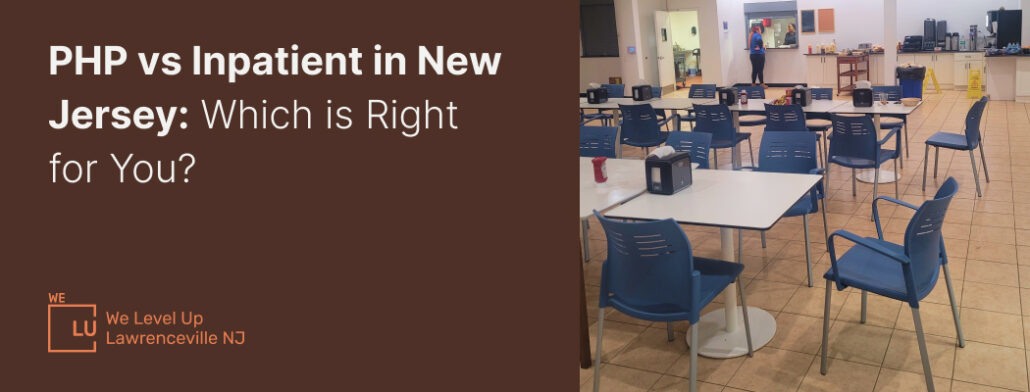When you are trying to make a choice between PHP vs Inpatient treatment for substance use disorder (SUD) here in New Jersey, just like anywhere else in the USA – the choice depends on more than one factor. Whether you are attempting to help a loved one decide or trying to help yourself choose the best possible options, your final decision should be made based on the severity of the conditions and the need of the affected person to be a part of a different, structured setting.
Although PHP offers a balance between intense treatment and personal freedom, it is the best option for those who are more stable or at a higher stage of the recovery process. Meanwhile, We Level Up Lawrenceville NJ offers highly-rated inpatient treatment as well, where we are able to provide round-the-clock care for those with more serious substance abuse issues.
Skip to:
What is Inpatient treatment?
When you are considering treatment options, it’s important to have a thorough understanding of what inpatient treatment is and how it differs from PHP. Unlike PHP, Inpatient treatment is a program intended for those who suffer from more severe cases of SUD. An inpatient program means that patients commit to living in a treatment facility for a certain amount of time. This way, they are able to be a part of a highly structured setting in a facility where they can feel safe enough to embark on a road to recovery.

Living in a treatment facility allows you to devote all of your attention to becoming well again. One of the biggest advantages is that you are able to avoid potentially stressful situations that could have a negative impact on your recovery. If you truly wish to end the cycle of addiction, you must take action to remove yourself from these dangerous situations – and that’s exactly what inpatient treatment is focused on.
In addition, the regulated atmosphere in inpatient and residential rehab in NJ is free from the distractions and stresses of daily life, making it ideal for getting better. When a patient is able to get a more thorough approach to recovery on a daily basis, it’s possible to treat the underlying causes of addiction and mental health problems; this includes individual counseling, group therapy, medication management, and other therapeutic activities.
Still, one of the main upsides of inpatient therapy is that it offers patients a controlled schedule. Whether you or your loved one are battling SUD or have a case of a co-occurring disorder, a well-thought-out daily schedule of mealtimes, leisure activities, and therapy appointments is a pattern that supports discipline and healthy habits, two very important aspects of long-term recovery.
At first, you may find being a part of inpatient treatment a bit overwhelming. Every person who decides to get better this way has to make a complete change in their living environment and habits. Inpatient program specialists at our facility understand if the patient isn’t feeling comfortable enough at the beginning of the treatment, and our clients are always encouraged to ask questions about the details of inpatient care.

What is PHP (Partial Hospitalization Program)?
A Partial Hospitalization Program (PHP) is a type of outpatient treatment that bridges the gap between inpatient care and traditional outpatient programs. PHP typically means that patients attend treatment services at the facility for several hours a day, up to five or seven days a week, after which they can return home to their normal activities. This kind of setup gives you intensive support and therapy during the day without the need for overnight hospitalization.
Without a doubt, one of PHP’s primary advantages is its capacity to offer comprehensive, intensive care while maintaining your freedom and sense of normalcy. This balance is especially important for those who can not commit to non-stop inpatient treatment because of obligations to their families, jobs, or educational institutions. If you are coming from an inpatient program, PHP can be very helpful as a step-down program since it offers a supportive environment while you reintegrate into daily life.
Our PHP services in New Jersey include a range of treatments, such as individual counseling, group therapy, psychiatric care, and medication management. The focus of PHP is not just on helping you develop coping strategies and understand the triggers of addiction but also on learning how to manage mental health conditions in the real world – not just during treatment sessions. The goal of this approach is to equip people with the tools they need to maintain long-term sobriety and mental health stability.
Get Help. Get Better. Get Your Life Back.
Searching for Accredited Drug & Alcohol Rehab Centers Near You? Or Mental Health Support?
Even if you have failed previously, relapsed, or are in a difficult crisis, we stand ready to support you. Our trusted behavioral health specialists will not give up on you. Call us when you feel ready or want someone to speak to about therapy alternatives to change your life. Even if we cannot assist you, we will lead you wherever you can get support. There is no obligation. Call our hotline today.
FREE Addiction Hotline – Call 24/7PHP also helps you establish a support network. Patients can form bonds with others who are facing similar struggles – this helps to foster a sense of mutual support among those affected by SUD. Peer involvement has repeatedly been proven essential to the therapeutic process because it promotes the sharing of coping mechanisms and life experiences. For those who require intense care but are able to cope with greater autonomy than a residential facility can offer, PHP provides substantial support and all-encompassing therapy. If you wish to achieve a balance between the freedom of living at home and strict treatment, it is a good choice.
PHP vs Inpatient Treatment
The question of PHP vs inpatient treatment can be answered if you compare them both and see how your unique situation fits into each option. Before reaching a decision, people usually consider the treatment setting and intensity. Inpatient treatment is a highly immersive, 24-hour care environment. Patients live at the facility, receiving constant medical and therapeutic support. This setting is particularly beneficial for people with severe SUD and MH conditions who require a highly structured environment and close monitoring. For instance, a patient with severe opioid addiction and a co-occurring disorder like major depression might find the controlled environment of inpatient care essential for initial stabilization and safety.

In contrast, PHP provides intensive treatment while allowing patients to live at home. This program typically involves attending treatment services for several hours each day, similar in intensity to the therapy provided in residential treatment but without the overnight stay. PHP is ideal for people who have a stable living situation and have completed an inpatient program or those whose conditions are sufficiently managed without 24-hour supervision. For example, someone recovering from alcohol dependency with moderate depression may benefit from the therapy of a PHP while maintaining their daily responsibilities and family life.
Another key difference between inpatient and PHP programs is the level of patient independence. Residential treatment offers a highly organized routine with scheduled activities, therapy sessions, and meals, leaving little room for personal autonomy. This structure is crucial for patients in the early stages of recovery, who might struggle with self-regulation and impulse control. PHP, on the other hand, allows for more personal freedom and responsibility. Patients can apply the skills learned during the day in their home environment each night, gradually rebuilding their independence and integrating recovery skills into daily life.
Both treatment types often offer similar therapies, such as individual counseling, group therapy, and medication management. However, the application and focus might differ. In inpatient treatment, therapies are often more intensive, focusing on deep psychological work and stabilization. In PHP, the emphasis might shift towards relapse prevention, coping strategies, and social support systems, preparing individuals for long-term recovery in their regular environment.
Benefits of Inpatient Treatment vs Benefits of PHP Treatment: The Pros of Each Treatment Modality
Inpatient treatment and Partial Hospitalization Programs (PHP) both have unique advantages that meet various demands and stages of the addiction recovery process. When choosing the best course of treatment, it helps to fully understand its advantages.

Get Your Life Back
Find Hope & Recovery. Get Safe Comfortable Detox, Addiction Rehab & Mental Health Dual Diagnosis High-Quality Care at the We Level Up Treatment Centers Network.
Hotline (877) 378-4154The immersive environment of inpatient care is ideal for those who require a high level of medical and psychological support. This treatment is often the first step for individuals who need a safe, controlled environment to detoxify and stabilize, away from potential triggers and stressful environments. Inpatient programs provide an established routine, intensive therapy, and continuous medical supervision, which are essential for addressing severe addiction and psychiatric issues.
This setting is particularly beneficial for those who have struggled with relapse or have not found success with less intensive treatment options. On the other hand, PHP serves as a middle ground, offering intensive treatment while allowing patients to live at home.
Benefits of PHP treatment:
- Increased flexibility: Allows continued participation in daily life (work, school, family) while receiving intensive treatment.
- Lower cost: Generally less expensive than inpatient treatment due to less intensive structure.
- Focus on reintegration: Provides skills and support for transitioning back to daily life.
- Gradual transition: Offers a step-down option after inpatient treatment or a step-up from outpatient therapy.
- Increased accountability: Regular involvement in treatment fosters commitment and responsibility.
Benefits of Inpatient treatment:
- Highly organized environment: Offers constant supervision and support.
- Medically monitored detox: Ensures safe and comfortable withdrawal from substances with medical supervision.
- Separation from triggers: Removes person from their usual environment, which reduces exposure to potential triggers.
- In-depth therapy: Provides intensive individual and group therapy sessions to address underlying issues.
- Peer support: Offers camaraderie and understanding from others who struggle with similar challenges.
Decision-Making: When to Choose Inpatient vs. When to Choose PHP
Difference between inpatient and PHP treatment does exist, although they both offer distinct benefits and cater to different stages and needs in the journey of addiction recovery. If you take some time and try to understand these benefits, it can help you select the most appropriate treatment program.
People suffering from SUD who are in need of extensive medical and psychological treatment find the immersive setting of our inpatient alcohol rehab center in NJ perfect.
For those who require a safe, regulated setting free from possible triggers and stressful situations to go through medical detox in NJ and stabilize, this treatment is frequently the initial step. To treat serious addiction and mental health problems, inpatient programs include a set schedule, intensive therapy, and ongoing medical supervision.
This setting is particularly beneficial for those who have struggled with relapse or have not found success with less intensive treatment options.
On the other hand, PHP serves as a middle ground, offering intensive treatment while allowing patients to live at home. PHP maintains a high level of treatment intensity – similar to inpatient care – but with more personal freedom.
First-class Facilities & Amenities
World-class High-Quality Addiction & Mental Health Rehabilitation Treatment
Rehab Centers TourRenowned Addiction Centers. Serene Private Facilities. Inpatient rehab programs vary.
Addiction Helpline (877) 378-4154Proven recovery success experience, backed by a Team w/ History of:
15+
Years of Unified Experience
100s
5-Star Reviews Across Our Centers
10K
Recovery Success Stories Across Our Network
- Low Patient to Therapist Ratio
- Onsite Medical Detox Center
- Comprehensive Dual-Diagnosis Treatment
- Complimentary Family & Alumni Programs
- Coaching, Recovery & Personal Development Events
Both inpatient treatment and PHP typically incorporate holistic addiction treatment approaches. These include a combination of medical management, individual and group therapy, and complementary therapies such as mindfulness, nutrition counseling, and recreational therapy.
The difference between inpatient and PHP treatment can mean a lot on your road to recovery
The choice between inpatient treatment and Partial Hospitalization Programs (PHP) can have a major influence on the effectiveness of the treatment and the course of recovery for SUD patients. Inpatient treatment offers 24/7 care, ideal for those with severe cases of addiction who require round-the-clock supervision. In contrast, PHP provides a balance of intensive treatment and independence, suitable for persons in a more stable phase of recovery or those who are currently transitioning from inpatient care.
The decision between PHP vs inpatient treatment should be based on a thorough and personalized assessment of the person’s specific needs, medical history, and personal circumstances. Consult with addiction treatment professionals, consider the severity of the condition, and evaluate personal responsibilities – this will help in making this choice.
Experience Transformative Recovery at the We Level Up Treatment Center.
See our authentic success stories. Get inspired. Get the help you deserve.



Start a New Life
Begin with a free call to an addiction & behavioral health treatment advisor. Learn more about our dual-diagnosis programs. The We Level Up treatment center network delivers various recovery programs at each treatment facility. Call to learn more.
- Personalized Care
- Caring Accountable Staff
- World-class Amenities
- Licensed & Accredited
- Renowned w/ 5-Star Reviews